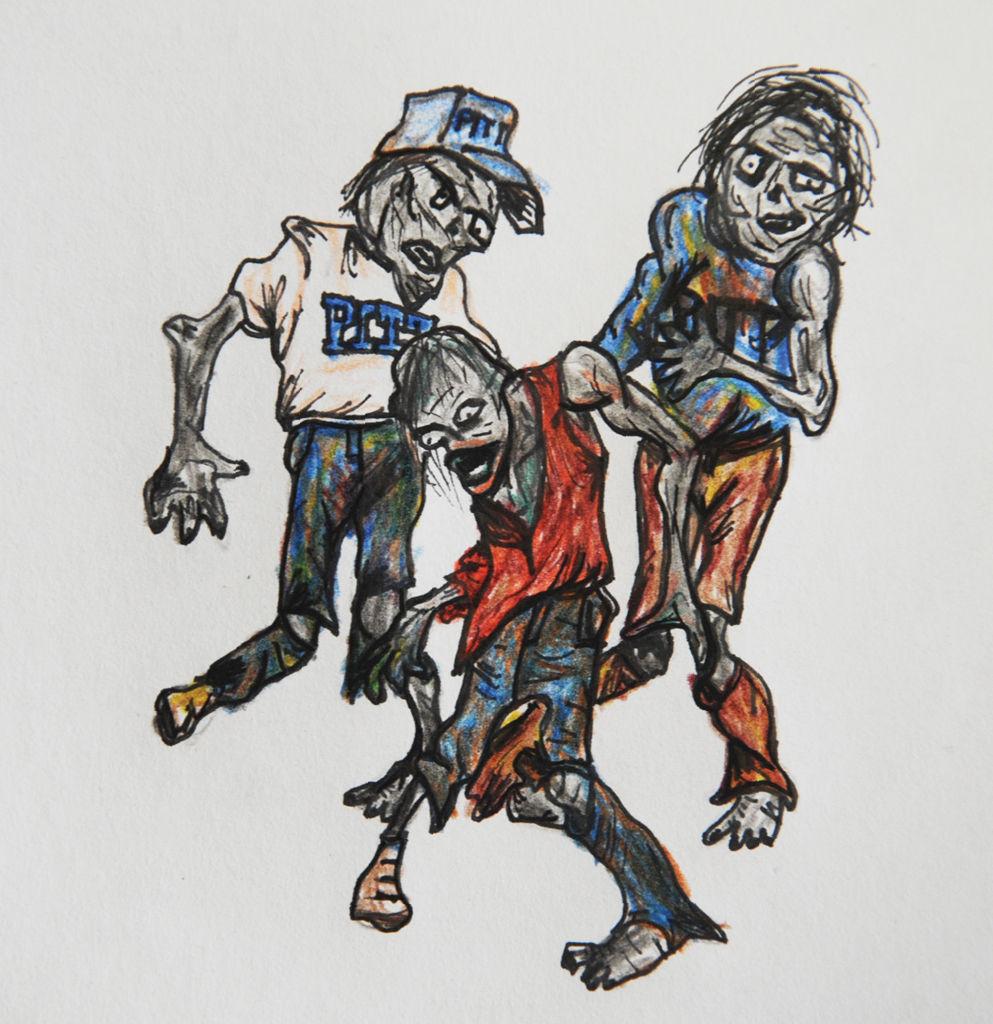

A group of humans raced across campus on Monday, a rainy April night. They tried to avoid swarms of zombies while attempting to reach a safepoint. Only two survived.
This isn’t a scene out of the latest horror film.
This dash from Posvar Hall to the OC Parking Lot on Allequippa Street was the final event in the Humans vs. Zombies(HvZ) games, which the Pitt Urban Gaming Club organizes annually.
Although HvZ players frequently infect Pitt’s campus with the zombie virus, Oakland isn’t the only yinzer home for zombies to roam. In the half-century since serving as the location for director George Romero’s “Night of the Living Dead” in 1968, Pittsburghers have remained fascinated with the undead. From zombie games to zombie walks to zombie stores, the city may bleed black and gold, but it lives on brains and gore.
Welcoming more than a few stragglers with arms outstretched, Pittsburghs annual zombie festival and walks often have record-breaking turnouts, such as “The It’s Alive 2007 Zombie Fest” in the Monroeville Mall, which set the Guinness World Record for the “Largest Gathering of Zombies.”
Meg O’Malley, a writer for the website Popular Pittsburgh, said the festival’s success inspired cities worldwide to host similar events and compete to have the most undead in one place.
“People [in Pittsburgh] get creative,” O’Malley said. “I’ve seen guys with pipes through their heads, and it looks real.”
Since they have to go to class inbetween roaming through moonless nights, the HvZ players may skimp on the costumes, but they make up for it with competition.
Players must buy their own equipment, and show up to battle in camo gear, packing the latest nerf gun models, according to club president Todd Silber.
“Players are engrossed in these games,” Silber, a senior majoring in philosophy, said. “We rarely see them take this casually.”
Students are eligible to play HvZ after they pay a $2 registration fee for a red bandana to mark their participation in the game.
The games begin with three designated zombies who wear their bandanas on their heads. Their ranks grow when they tag other players with their hands — which, according to the rules, “infects” them. Only a handful of players, typically less than 10, make it to the end without being tagged.
On a global scale, although countries such as Mexico and Chile claim higher numbers for their respective fests, the Guinness Book of World Records recognizes a gathering of 8,027 zombies at the Midway Station in Saint Paul, Minn., in 2012 as the most recent record-breaker.
But living-dead pride runs deep in Pittsburgh, according to O’Malley.
The Pittsburgh Zombie festivals occur in October and sell zombie-themed products like T-shirts, DVDs and other apparel at a stand set up by the House of the Dead, a local retail shop.
The Lawrenceville store is owned by Stuart Neft, who considers it to be “the only zombie-specific store in the world.” Neft opened the store more than two years ago to enrich Pittsburgh’s obsession with a place that sells zombie-themed jerseys of teams such as the Penguins and the Steelers.
“Pittsburgh is considered the zombie capital of the world,” Neft said. “The city sees a surprising number of tourists. A few come just to visit places like the Monroeville Mall or Evans City Cemetery.”
Romero used both sites as settings for his influential films. “Night of the Living Dead” was filmed in Evans City, a small town with a population of about 1,800, located about 28 miles outside of Pittsburgh.
Growing up surrounded by the locations used in Romero’s genre-defining movies led to many fans, including O’Malley, developing a lifelong love for zombie culture. She said that knowing the history of places such as the Monroeville Mall is “second nature” to the city’s citizens.
Romero used the now-iconic mall as the main setting of “Dawn of the Dead,” a 1978 zombie horror movie that received universal praise from critics like Roger Ebert and has since been considered a classic of the genre.
The city’s performers also remain dedicated to zombie culture.
From 2010 to 2011, three successful runs of the stage production “Evenings in Quarantine: The Zombie Opera” ran at the Grey Box Theatre in Lawrenceville and at Pittsburgh’s Kelly Strayhorn Theatre in East Liberty, according to the show’s website. The website explains that the opera acknowledged Pittsburgh as the “birthplace of the zombie.” A representative from the show was not available for comment.
Pittsburgh’s influence on the genre appears in other mediums, too. The video game “Left 4 Dead” places players in a zombie apocalypse, using local areas like the Allegheny National Forest and the UPMC Mercy Hospital.
In recent years, the success of the popular AMC show “The Walking Dead” has placed an interest in zombie culture in Atlanta, the city used for much of the show’s filming locations. But fans like O’Malley aren’t worried that this will cause Pittsburgh’s association with the undead to fade.
“Zombie culture wasn’t fully perfected until Romero [filmed here],” O’Malley said. “His films defined what a ‘zombie’ is. Pittsburgh has become the perfect setting for zombies.”
Recent Posts
Therese Pitman: Giving back to Pitt’s student-athletes with equality
Pitman is Pitt’s Director of Student Athlete Development where she helps student-athletes navigate their career…
Pitt speech and debate team heads to nationals
The William Pitt Debating Union, Pitt’s speech and debate team, sends students to both in-person…
Visuals: A Year in Review
The visuals desk had an interesting year. In the midst of the 2024 Presidential Election,…
De-stress events across campus offer students a break from studying
During finals week, departments across campus are offering wellness events to help students manage stress…
Pitt students share their summer plans
After a long and strenuous academic year, many students are excited to take a break.…
Column | Collaboration and connection make us better — yes, even in journalism
Today is the last day I will ever do this, and despite the amount of…
